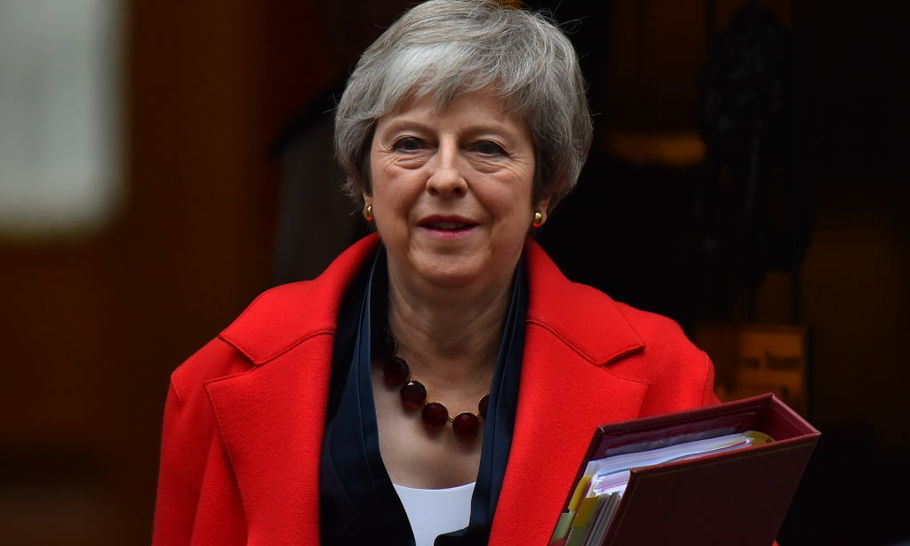The 2016 majority for Brexit has evaporated. It's time for May to turn around.

Photo by Alberto Pezzali/NurPhoto via Getty Images
Benjamin Disraeli in opposition once teased his Tory rival, Robert Peel – who adopted liberal positions on free trade – that he “had caught the Whigs bathing and walked off with their clothes.”
The big political figures are best known for giant U-turns rather than stubborn hole-digging in defence of past verities. A Labour example was Aneuran Bevan, the darling of the left, telling the Labour Party conference on 1957 that it was indulging in an “emotional spasm” in promoting unilateral nuclear disarmament which would mean sending a Labour Foreign Secretary “naked into the conference chamber.”
Bevan’s defence of Britain’s nuclear deterrent shocked the his admirers on the Labour left, but it started the process of making Labour electable – just as Tony Blair’s ditching of the Labour anti-European line (which dominated the party after 1979) helped seal the deal with business in the run-up to the 1997 election.
Might Theresa May manage to walk off with the Remainers’ clothes before it is too late as she searches a way out of her Brexit quagmire?
Famously, Mrs May plays her cards so close to her chest, she probably cannot see them herself. But she is a Keynsian in the sense that if the facts change, she changes her mind.
The facts in support of Brexit are like Lewis Carroll’s Cheshire Cat. They are all slowly disappearing with only the grimace left on the face of hardline Brexit ideologues who know their cause is losing, not gaining ground.
“The Swiss rejected EEA membership 25 years ago, and still haven’t finished negotiating a final deal with Brussels on a definitive EU-Swiss relationship.”
Just about every opinion poll or serious survey shows that the Brexit majority of June 2016 has evaporated. Hundreds of thousands of the elderly voters in England outside main cities who voted Brexit have passed away, while at the other end of the age spectrum, hundreds of thousands of younger citizens are now eligible to vote – and all polls show they are 9-1 in favour of not losing their right to live and work in Europe if they so choose.
To be sure, the country remains divided. But what’s new? There has never been a cosy, comfortable majority on any major choice in British democracy. But as we head for 2019 there are new facts about the economic consequences of Brexit, and the loss of the existing rights to live, work or retire in Europe.
Under all interpretations of the Withdrawal Agreement and political declaration, there will be a Brexeternity of tetchy, difficult negotiations after 29 March 2019 between the UK and the EU. The Swiss rejected EEA membership 25 years ago, and still haven’t finished negotiating a final deal with Brussels on a definitive EU-Swiss relationship. Brexit will dominate the general election in 2022 and subsequent elections in the next decade.
For now, Brexit is like a giant tube of super glue squeezed into British politics, government, business, universities and the relations between the constituent nation of the United Kingdom. Everything is blocked. Labour’s leadership cannot escape its pro-Brexit trap and trails miserably alongside the Tories in opinion polls, despite poor economic growth and endless cuts.
One way to cut this Gordian knot is to hold a new consultation. 700,000 people marched for this in London in one of the biggest post-war demonstrations ever. That is more than 1000 on average from every constituency. Of course a demo doesn’t change policy but just as those who marched against the Iraq war were right, so too the nation’s mood is changing on Brexit.
Mrs May could put herself in tune with the fact that the 2016 majority has disappeared. Yes, it would cause a row with one or two newspapers and hardline Tory anti-Europeans, but 90 per cent of business — especially all foreign firms who came to Britain on the solemn promise of previous prime ministers that they would have full access to the single market of 450 million customers – would welcome a change of mind.
Re-aligning the Tory party with business and catching Labour flat-footed would be a political stroke.
It is now down to the Prime Minister. In the past she has surprised the Tories – calling them the “nasty party” in 2002 or dropping the scheme to send out “Shop an Immigrant” vans after she became Home Secretary. Similarly she dropped her “No Deal is Better than a Bad Deal” mantra. She has swivels built into her kitten heels. Dare Mrs May take a risk? After the 2017 election probably not. But the opportunity is there.





